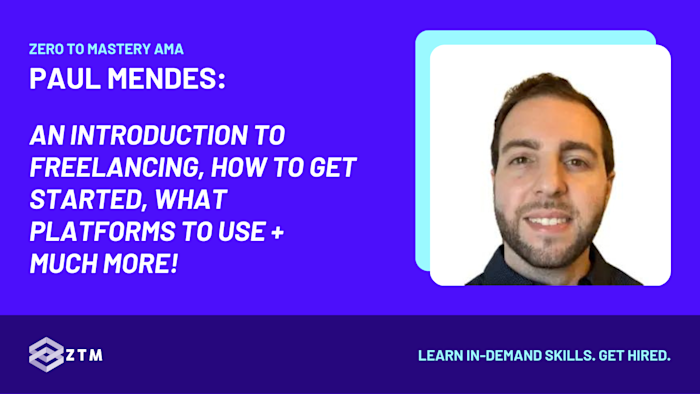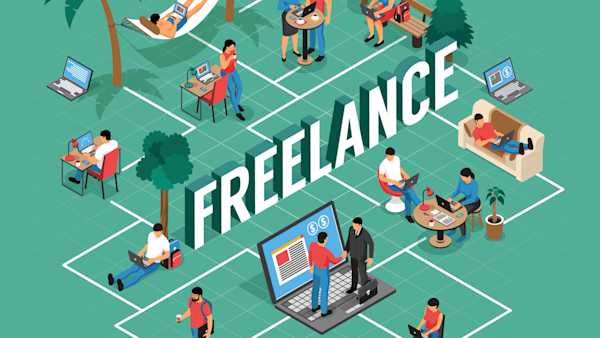A quick note from the editor:
We recently got to join and moderate a live AMA call that Paul Mendes did with our students in the Zero To Mastery virtual campus.

Students and I asked questions about Freelancing and how it works, how best to learn this ‘career path’, how it compares to working for an employer, some technical questions on the best platforms and tools to use, and much more.
You can check out some of Paul’s answers to the questions from his AMA call below, but first, let me introduce him.
Who is Paul Mendes, and why should you listen to him?
Paul has worked his way up to becoming one of the top-rated Freelancers on Upwork and is now helping others, just like you, replicate his success to become profitable while working for themselves.

You don’t always need to be employed to make money from programming, which is why Paul teaches the Complete Guide to Freelancing and the Complete Guide to Consulting courses here at ZTM.
Across those 2 courses, there are 17 hours of in-depth training on how to get paid while working for yourself, so as you can see, Paul clearly knows what he's talking about.
It was a great interview so with the intro out of the way, let’s dive into his AMA answers 😀.
Psst…
Want to watch all the recorded AMA videos, ask questions in our Discord, or join in live on our next expert AMA?

Well, these are all exclusive access bonuses for members of Zero To Mastery. You can find out more details about every course and the other benefits of being a ZTM member here.
Anyways, let’s dive into these questions…
What is Freelancing?
In my opinion, freelancing is the latest evolution in how you can work, but the problem is that it’s often missed by people.
Why?
Well when you first graduate college or gain your skill set through a platform like ZTM, your initial thoughts are almost always about joining a company and then working with them (and other companies) for most of your life.
The reality though is that there’s a whole other way to be able to provide your skills and be paid (often better than an employee) without being stuck to a single company, and that’s via freelancing.
It works like this:
- You have a specific skill set or level of experience
- You then offer those skills as a productized service to multiple clients. This can vary in what you create, but often you’ll niche down to a particular area
- Because you niche down, you can usually ask for more money as an expert in that area
- And because you’re doing the same projects, you can start systemizing and speeding up production on that offer, meaning less time needed to work for the same money
For example
You could build websites on a platform like Upwork, specializing in Shopify e-commerce builds.

This would mean a smaller pool of customers, but still far more than you could ever deal with in your lifetime. But because you specialize, you can charge more. I know a boutique Shopify agency that charges $5-10k per site build, but they started out building on freelance platforms first.
And because you’re your own boss, you could work a 3 day week, building multiple websites and making easy money, and then take the summer off to go surfing, or turn your profile back on for accepting clients when the waves are bad.
Simple right?
We actually talked about someone doing something very similar in this article here.
He only charges around $850 a website, but he has over 1,000+ 5-star reviews, all from verified customers!

The really crazy thing is that not every customer will leave a review, so he’s probably built more than 1,000 sites! At the very least we can estimate that he’s made over $850,000.
What are the pros and cons of being a Freelancer?
There are a lot of benefits of being a freelancer, but obviously, there are a few pros and cons, so let’s look at the main ones.
Con: Freelancing can often come with more responsibilities
The biggest issues that new freelancers struggle with is being sure to deliver services at a level the customer is happy with, while also spending time finding clients and chasing invoices.
It gets a lot easier when you use 3rd party platforms to both find clients and deal with payments though.
Pro: You choose when and where you want to work
There’s no clocking in at 9-5 as a freelancer. You can pick and choose your hours, which is usually great but not always…
Pro and Con: You earn via project completion vs hours spent working
Because you’re offering a service, time isn’t a factor in how much you get paid, which can be both a good and bad thing. When you first start out, it might take you more hours to complete a client project than you first estimated.
Heck, you might even undercharge at first due to a lack of confidence in your skills, or simply wanting to get more experience and some clients under your belt. There’s nothing wrong with this, as long as you move past it.
As you start to skill up and gain experience and build systems, you’re often able to complete those projects in far less time, while still being paid X amount per project. Suddenly you’re earning much more than you could previously in a 9-5, while charging what you're worth.
Then, if you specialize in a particular area, you can then charge more for that skill set. You go from a social media marketing person to a paid ads person, to ONLY Google ads. Again, fewer customers but higher billable project rates.
Pro: You can bundle services for more money
Rather than just stopping at the initial service, you could also offer upsell opportunities.
For example
Let’s say that you build a website for someone. You could also offer maintenance services for monitoring downtime, adding plugins, updating them, improving hosting and site speed etc.
Usually, this would take very little time each month for you to implement, but you can now get a recurring payment from each client while also getting affiliate commissions for hosting and site speed tools.
Tl;dr
Freelancing isn’t about not working hard (at least not a first).
Instead, it’s about giving yourself more flexibility and the ability to scale your earnings past what a 9-5 job can offer. However, there’s usually a learning curve at first as you start to put systems in place.
This is why we recommend learning from established freelancers and how they built their businesses.
What’s the best path for getting started as a Freelancer?
This is an oversimplification, but really we can break it down into 2 steps:
Step #1: Decide on a skill or service to offer
The first thing to do is figure out what kind of skill or service you can offer and get paid for.
If you’re brand new and just starting out learning to code, then of course you need to get some level of knowledge under your belt first, before you can offer anything for sale.
That being said, you don’t need to know everything about a topic to be able to start charging for it. You’ll be surprised by what you can create or offer even at your current level of expertise.
Editor's note: I know people who are selling WordPress site builds who are simply installing and customizing themes to meet the client's design specs. This is fine because the customer doesn’t want a unique, brand-new, hard-coded site sometimes. What they really want is just their website built on WordPress.
This is a common issue with new freelancers. You don’t need to create or invent something new for you to be able to sell it. Just like you don’t need to be a head chef to sell burgers, you only need to know enough so that the customer enjoys the food and doesn’t have to cook it themselves.
With just some basic HTML and CSS, and a few hours of playing with WordPress themes, you could also start selling sites for $800 a pop if you want to, while still learning to code or learning more advanced Web Development so that you can eventually take on more complex (and more profitable) projects.
So think about your current skill set right now and what you can offer, and don’t hold off charging for a service until you’re the absolute expert. Start at Mcdonald's level to get paid while learning, and then get to that Michelin star and charge more and build faster.
If you’re not sure what you can offer, you can check out platforms like Upwork and see what’s being offered already in your skillset.

Have a look at what other people are offering, how much they charge, and if you could offer the same or better.
Failing that, look at common threads on your own social media and friend groups. What do people you know currently struggle with that would be easy for you to do, but they would happily pay for?
Chances are that a lot of other people would want the same thing.
Step #2: Offer that service!
You can either speak to your family member or friend and provide that service for them for cheap as a testimonial and practice, or go straight to Upwork and start offering services there.
Better yet, build your profile on Upwork first, then get your friend to sign up as your first sale. That makes it more legitimate, you get a review and show you’ve done work, and you can get paid.
Simple!
And don’t worry about committing to a particular service or skill right now. You can always change it as you start doing that role. You don’t have to stay as "the WordPress person". You can switch or change your offers and edit your account at any time. The key is to just get started.
What do you think will be the most popular ‘broad’ Freelancing skill in 2023?
Now bear in mind that this is my opinion based on what I see in the marketplace.
If I had to say a broad skill for Freelancing in 2023 and beyond, it would be anything to do with marketing, simply because businesses will always need help to get more customers, regardless of the platform you choose to market with.
I always see a ton of customer requests being posted every day on Upwork for marketing experts to fulfill, so if you’re not sure what to offer, then some kind of Digital Marketing is a great freelancing channel to go into for 2023.
What do you think will be the most popular ‘programming’ Freelancing skill in 2023?
This ties into the answer above, but businesses always need help either acquiring or interacting with their customers.
That’s why I feel some kind of full-stack skillset, such as application or website development will always be in demand. Especially if you have that full-stack skill where you can build the whole thing, as this will almost always be more appealing than the client needing to hire a designer and a front-end developer and a back-end developer.
If you’re learning to code now and want to look into this, then having full-stack expertise will really help you stand out and get clients, but it’s not the only option available.
If I was to look at any other skills, then I would recommend either Blockchain Development or Cyber Security. Both of these are in high demand and growing each year, and pay super well.

Bear in mind that that’s for salaried roles. If you’re a consultant or contractor, then you can often pick up 6 figures for a 3-6 month project.
Heck, some Cyber Security bug testing will offer $10-20k if you can find the flaw in their code, and they don’t care how quickly you solve it, they’ll pay for the solution.
Is it worth joining Freelancing platforms, such as Upwork or Fiverr?
Totally! You don’t actually need to be on a freelancing platform to be successful, but for most people, it’s the best place to start on (and even stay with) for your career.
Why? Because there are so many benefits to joining these platforms (and I recommend you join a few of them).
You get:
- A large number of potential customers visit daily. These platforms do very well in Search Engines and they also spend thousands of dollars per day in paid ads. If you’re not on there, then you’re usually competing with them
- There's no effort for you to attract or even sell to customers. Fill out your service pages and people will buy. You don’t need to chat back and forth either, because if they are there for the service then they are ready to buy today. A lot of freelancing and client acquisition on your own means dealing with a lot of tire kickers (aka people who will waste your time but never hire you)
- Invoices are automated without you needing to do anything after setup. Again, no chasing after late payments as it’s all done via the platforms
There are other benefits also, but these 3 things help to remove 90% of the extra bloat work from freelancing, so you can focus on the service you offer instead.
You don’t need to build your own site, rank it in Google, run ads, create sales pages, link payment providers, etc. You can still have all that, but you can also start getting easy sales by being on a platform first.
Better still?
Just like an Uber driver and Uber customer rating, each client on a site like Upwork has to make an account to be able to hire on there. This means you can go in and check out those customers' reviews before you accept their projects and see if you want to work with them.
You can see details like how much they’re paying for projects and if they pay on time etc - all worth knowing before you start work!
What's a good daily routine for when you become a Freelancer?
It can change day to day, but I like to do the following:
- Start the day with exercise and no apps
- Then work on my client project while I’m fresh
- Then I reply to messages and client applications
- And if I’m finishing up projects soon, I’ll do some prospecting for new clients in the afternoon
This can vary based on your own needs, but for me, this works best as I perform at my highest level, and focus on the most important tasks early, and then fill my pipeline or do odd tasks in the afternoon.
Should you quit your job to start Freelancing?
Some people have a ‘burn the boats’ mentality, where they think by quitting their job they will have the motivation to see their side hustle project to success.
Personally, I think you should keep your current job, even if you intend to transition to your side hustle at some point. Instead, I recommend working on your freelance projects on the side, and staying with your job until your freelance work meets or exceeds your current income levels.

The beauty of this is that you never have to worry about money. Sure it takes more effort to be working in your spare time, but it also helps you to take action because your time is limited.
There’s nothing like having a limited time frame to really focus on the most important tasks!
🔥 Want to learn more about Freelancing?
Well, go ahead and check out the Complete Guide to Freelancing course here, where Paul goes much deeper and walks you through everything step-by-step, all the way to getting your first client.
The best part is that you can try it out and see if you're liking it. Maybe you just end up with some side income and keep your current job or maybe you love the freelancing life and can make it your full-time income!








